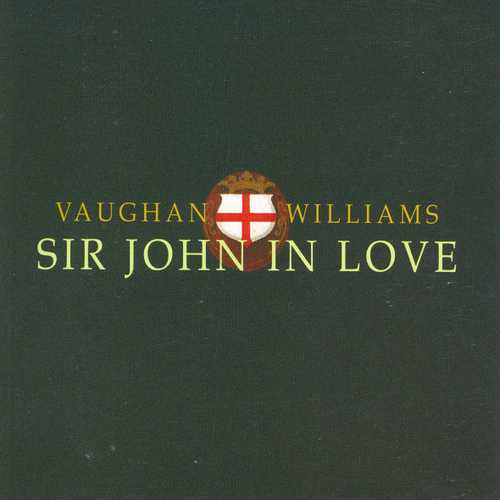
Composer: Ralph Vaughan Williams
Performer: Adrian Thompson, Matthew Best, Susan Gritton, Donald Maxwell, Daniel Norman, Roderick Williams, Mark Padmore, Stephen Varcoe, Anne-Marie Owens, Sarah Connolly, Mark Richardson, Stephan Loges, Brian Bannatyne-Scott, Henry Moss, John Bowen, Laura Claycomb, Richard Lloyd Morgan, Sinfonia Chorus
Orchestra: Northern Sinfonia
Conductor: Richard Hickox
Number of Discs: 2
Format: FLAC (tracks)
Label: Chandos
Catalogue: CHAN9928
Release: 2001
Size: 580 MB
Recovery: +3%
Scan: cover
Sir John in Love
CD 01
01. Act I: Orchestral introduction – What hoa, what hoa! (Shallow, Sir Hugh Evans)
02. Act I: Ahem (Anne Page)
03. Act I: This is my father’s choice (Anne Page)
04. Act I: How now, what does Master Fenton here? (Page)
05. Act I: Vere is dat knave Rugby? (Dr. Caius)
06. Act I: Episode
07. Act I: How now, mine Host of the Garter (Bardolph, Nym, Pistol)
08. Act I: I spy entertainment in her … (Sir John Falstaff)
09. Act I: Wilt thou revenge … ? (Pistol)
10. Act I: Love my wife? I will be patient (Ford)
11. Act II Scene 1: Orchestral introduction
12. Act II Scene 1: Thine own true knight (Mrs. Page) – Sigh no more, ladies, sigh no more (Mrs. Quickly)
13. Act II Scene 2: Bardolph! Bardolph, I say! (Sir John Falstaff)
14. Act II Scene 2: Go thy ways, go thy ways, old Jack! (Sir John Falstaff)
15. Act II Scene 2: Sir, my name is Brook (Ford)
16. Act II Scene 2: Ha, is this a vision? (Ford)
CD 02
01. Act III Scene 1: Interlude: Orchestral introduction – Yet hear me speak (Fenton)
02. Act III Scene 1: Interlude: Fair and fair and twice so fair (Chorus of Young Women)
A03. ct III Scene 1: Interlude: But listen, good mine Host (Anne Page)
04. Act III Scene 2: Orchestral introduction – When as we sat in Papylon (Sir Hugh Evans)
05. Act III Scene 2: Yonder he’s coming (Peter Simple)
06. Act III Scene 2: Come, Master Ford (Page)
07. Act III Scene 2: Orchestral introduction
08. Act III Scene 3: What, John! What, Robert! (Mrs. Ford) – Alas, my love, you do me wrong (Mrs. Ford)
09. Act III Scene 3: Mistress Ford! (Mrs. Quickly)
10. Act III Scene 3: Ah! (Ford, Chorus of Men)
11. Act IV: Orchestral introduction
12. Act IV Scene 1: : Pardon me, wife (Ford) – There is an old tale that goes Herne the hunter (Mrs. Page)
13 .Act IV Scene 1: (Interlude)
14. Act IV Scene 2: Orchestral introduction
15. Act IV Scene 2: The Windsor bell hath struck 12 (Sir John Falstaff)
16. Act IV Scene 2: Ah – (Mrs Ford) – Who comes here? (Sir John Falstaff)
17. Act IV Scene 2: But till ’tis 1 o’clock (Mrs. Qucikly)
18. Act IV Scene 2: Dance of the Fairies
19. Act IV Scene 2: But stay! I smell a man of middle earth (Sir Hugh Evans)
20. Act IV Scene 2: Nay, do not fly (Page)
21. Act IV Scene 2: My heart misgives me (Mrs. Page)
22. Act IV Scene 2: Stand not amazed (Sir John Falstaff)
There’s no lack of glorious melody in Sir Johnin Love, and not just folksong cunningly interwoven.
Musically, what comes over strongly, more richly than ever before in this magnificent recording from Richard Hickox, is the way that the writing anticipates later Vaughan Williams, not just the radiant composer of the Fifth Symphony and Serenade to Music, with keychanges of heartstopping beauty, but the composer’s darker side, with sharply rhythmic writing.
The work’s title, Sir John in Love, points to Vaughan Williams’s different approach to the central character. With him Shakespeare’s fat knight isn’t just comic but a believable lover, more genial and expansive than in Boito’s portrait, yet hardly a noble figure such as Elgar portrayed in his big symphonic study. Donald Maxwell makes a splendid Falstaff, relishing the comedy without making it a caricature. Above all, his full, dark voice is satisfyingly fat-sounding. On Vaughan Williams Opera 1205 the only previous recording, the vintage EMI set of 1974, Raimund Herincx gave a finely detailed performance, but lacked that important quality.
The 1974 set certainly stands the test of time remarkably well, but the extra fullness and richness of the Chandos sound coupled with as keen a concern for the atmospheric beauties of the score, notably in offstage effects, gives the new set an obvious advantage. Interpretatively, Hickox is just as incisive as Meredith Davies on EMI in bringing out the sharper side of the score, though he’s more warmly expressive, a degree more affectionate in drawing out the glowing lyricism.
Chandos’s casting is satisfyingly consistent, with no weak link. Matthew Best may be rather gruff at times as Ford, but that’s very much in character, when, if anything, he’s more venomous here than in Verdi, until at the start of Act 3 Vaughan Williams allows a wonderful duet of reconciliation with Mrs Ford, ‘Pardon me, wife’.
As Ursula Vaughan Williams has reported, her husband wrote Sir John in Love ‘entirely for his own enjoyment’, because he was in love with the subject. And from first to last this new set reflects that.